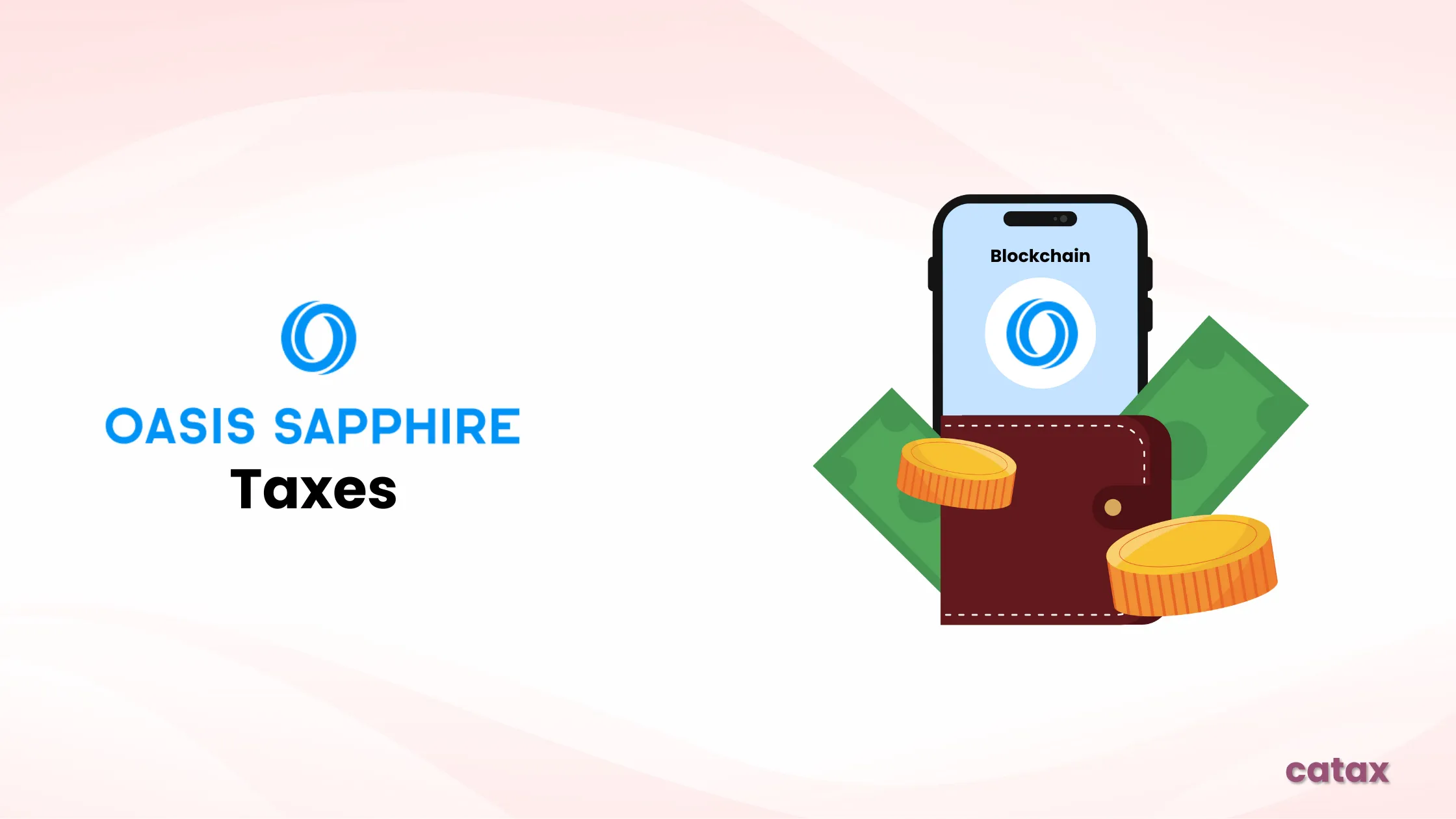Cryptocurrency tax rules vary by country, and Oasis Sapphire (ROSE) taxes transactions may be taxed differently depending on local regulations. Whether you buy, sell, trade, or stake ROSE, understanding how tax authorities classify these activities helps you stay compliant and avoid penalties.
This guide simplifies Oasis Sapphire tax rules so you can manage your taxes confidently and stay on the right side of the law.

- How to Connect Your Oasis Sapphire Wallet to Catax
- Are Oasis Sapphire (ROSE) Transactions Taxable?
- Can You Deduct Trading Fees and Other Costs?
- How Is Oasis Sapphire (ROSE) Taxed Based on Holding Period?
- How Is Staking Income Taxed?
- Can You Claim Oasis Sapphire Losses for Tax Benefits?
- How to Stay Compliant with Oasis Sapphire (ROSE) Tax Rules
How to Connect Your Oasis Sapphire Wallet to Catax
To track your Oasis Sapphire (ROSE) transactions and calculate taxes effortlessly, follow these steps to connect your wallet to Catax:
- Open your Oasis Sapphire wallet or access a block explorer (such as Oasis Wallet, MetaMask with Oasis support, or any compatible wallet).
- Copy your public wallet address from your Oasis Sapphire wallet.
On Catax:
- Log in to Catax and select your country.
- Select Chain, then search for Oasis Sapphire Wallet.
- Paste your public wallet address and click Connect.
Once connected, Catax will automatically track your ROSE transactions and simplify your crypto tax reporting.
Calculate My Taxes ➤Are Oasis Sapphire (ROSE) Transactions Taxable?
Yes, in most countries, Oasis Sapphire (ROSE) transactions are taxable. Tax authorities may classify ROSE as a capital asset, property, or income depending on how it’s used.
When Do You Have to Pay Taxes on Oasis Sapphire (ROSE)?
You may need to pay taxes when you:
- Sell ROSE for a profit – If you sell your Oasis Sapphire tokens for more than you paid, the gain is usually subject to capital gains tax.
- Trade ROSE for another cryptocurrency – Swapping ROSE for Bitcoin, Ethereum, or other crypto assets can trigger a taxable event.
- Use ROSE for purchases – Buying goods or services with ROSE may cause a taxable gain if your tokens have appreciated in value.
- Earn ROSE from staking – ROSE earned through staking activities is generally considered income and taxed when received.
- Receive ROSE as payment – If you’re paid in ROSE for goods or services, the value at the time of receipt is usually taxable as income.
Since tax treatment varies by country, always review your local crypto tax regulations.
Can You Deduct Trading Fees and Other Costs?
Oasis Sapphire users often wonder if they can claim expenses tied to managing or trading ROSE. This depends on your local tax laws.
Some countries allow deductions for:
- Trading fees during ROSE purchases or sales
- Network/transaction fees for moving ROSE between wallets
- Security costs, like buying a hardware wallet or setting up secure storage
Others may only allow:
- Deducting the purchase price of ROSE (cost basis) without additional expense deductions.
Check your country’s specific tax rules to understand which costs are deductible.
How Is Oasis Sapphire (ROSE) Taxed Based on Holding Period?
Your tax rate on ROSE profits may vary based on how long you held the tokens:
- Short-term holdings (less than one year) – Typically taxed at standard income tax rates.
- Long-term holdings (more than one year) – Some countries offer reduced tax rates for long-term crypto gains.
- Flat-rate systems – In some jurisdictions, a fixed tax rate applies regardless of holding duration.
Knowing your country’s tax system can help you create a smarter tax strategy and potentially lower your total tax burden.
You can also check out our Country-Specific Guide for Crypto in Your country. This guide provides insights on regulations, tax implications, and compliance measures breifly explained for each country.
How Is Staking Income Taxed?
Staking ROSE on the Oasis Sapphire network can earn you passive income—but tax treatment varies by country. Some governments tax staking rewards the moment you receive them, while others wait until you sell or exchange the tokens.
How Countries Tax Staking Rewards
- Taxed as income – In many countries, staking rewards are treated like income and taxed when received. The ROSE tokens are valued at their market price at the time you earn them and taxed at your regular income rate.
- Taxed as capital gains – In some places, tax is only triggered when you sell your staked ROSE. In this case, the difference between the value at the time of receipt and the sale price determines your capital gain.
Knowing how your country handles staking taxes helps you plan better and avoid unexpected tax bills—even if you don’t sell your ROSE right away.
Can You Claim Oasis Sapphire Losses for Tax Benefits?
Not all ROSE trades are profitable. Selling ROSE at a loss could help you reduce your tax burden—depending on your country’s crypto tax rules. How Different Countries Handle Crypto Losses:
- Loss offsets – Some countries allow you to use ROSE losses to offset profits, reducing your total taxable gains.
- Loss carryforward – If you didn’t make any gains this year, you might be able to carry your losses forward and apply them to future profits.
- Limited deductions – Certain governments don’t allow deductions for crypto losses at all, meaning you can’t use them to lower your taxes.
Accurate transaction records are key to reporting losses correctly and claiming benefits where allowed.
How to Stay Compliant with Oasis Sapphire (ROSE) Tax Rules
As crypto regulations evolve, it’s crucial to stay compliant. Here’s how:
- Understand your country’s tax treatment – Are ROSE transactions taxed as capital gains, income, or business revenue?
- Maintain clear records – Track every ROSE transaction, including staking, trading, spending, or receiving ROSE.
- Use a crypto tax tool like Catax – Tools like Catax automate tracking and tax calculations, making your reporting easier and more accurate.
Staying informed and organized will help you manage your ROSE taxes confidently and avoid penalties.
Book a Free Consultation Now →

